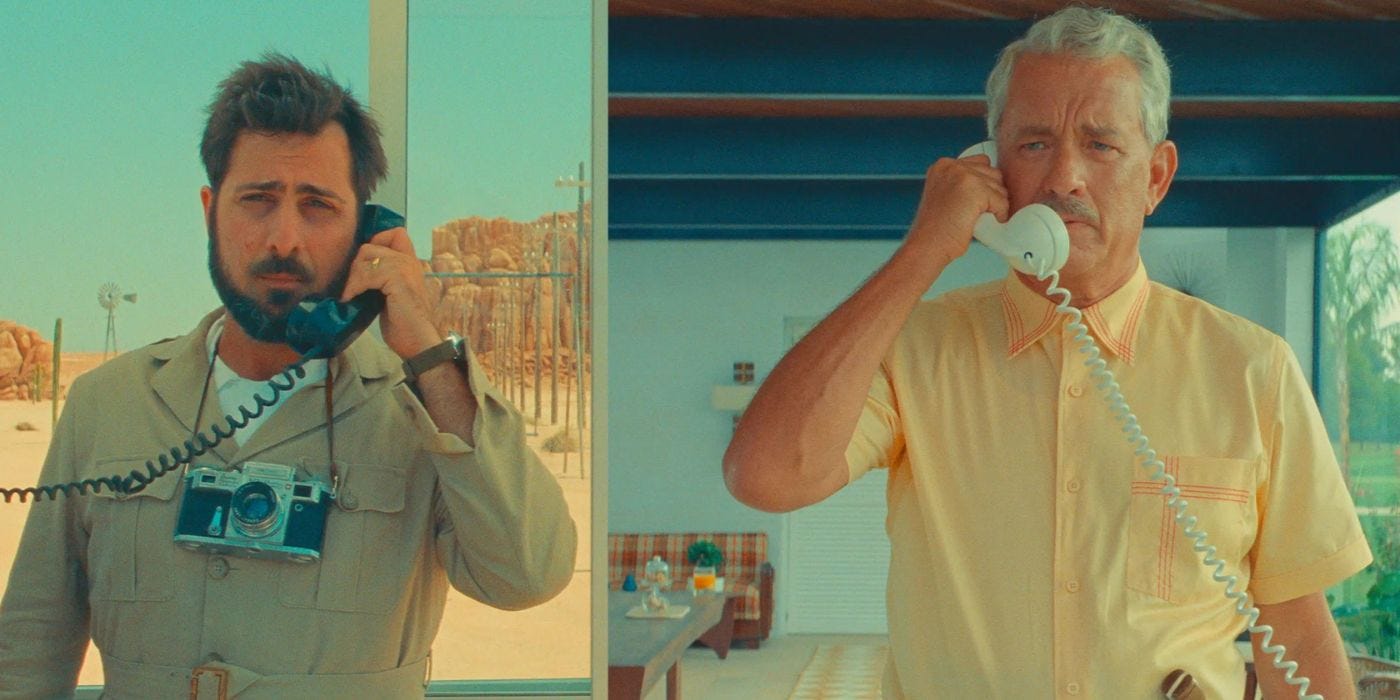Asteroid City
Wes Anderson's latest may not convert any of his naysayers, but longtime fans will find much to love.
Wes Anderson is a filmmaker you either love or hate, but regardless of how you may feel, his craftsmanship and artistry are undeniable. He’s one of those rare directors that even when he starts to get a little too ambitious for his own good, still feels completely in control.
Quentin Tarantino has said that he makes his movies for himself first, which might also be true for Anderson. Personally, I’ve always been a massive fan of Anderson’s filmography, it did take some time for me to appreciate it, but once I did, I was in love. He’s one of those filmmakers who broadened my love of cinema and helped solidify my taste as a viewer.
“Asteroid City” is Anderson’s latest film and perhaps his most daring outing yet, and for a director who is no stranger to building big ensembles, this might just be his most impressive.
The film is told through three formats, a stage play, an old “Twilight Zone” TV show, and the “Asteroid City” story that’s being advertised. In a meta twist, we are constantly being reminded by the narrator (Bryan Cranston) that what we’re watching is a complete work of fiction. The plot itself is quite dense, the simple gist is “Asteroid City” is, in fact, a stage play written by the renowned playwright Conrad Earp (Edward Norton).
The play follows war photographer Augie Steenbeck (Jason Schwartzman), who is recently trying to grapple with the loss of his wife and attempting to break the news to his genius son Woodrow (Jake Ryan) and his three doting daughters, while on a trip to the Junior Stargazer convention. He’s also trying to still keep a relationship with his father-in-law Stanley Zak (Tom Hanks).
At the Stargazer convention, Augie forms a connection with method actress Midge Campbell (Scarlett Johansson), who he talks with from their respective motel windows. Woodrow’s beliefs and worldviews are suddenly changed by the arrival of an alien, which causes the military to put the titular town into quarantine.
If you’re not a fan of Anderson’s stylings and sensibilities as a director, then “Asteroid City” will most certainly not be for you. His sense of humor and the dialogue delivery is dryer than ever, the story is even more dense, and of course, there’s much more to it than meets the eye. Everything on a technical level, from the outstanding production design to Alexandre Desplat’s whimsical score is fabulous and done as close to perfection as possible.
Those who are big on Anderson’s distinct sense of humor will have no trouble finding some good laughs here as well.
Even with all that being said, “Asteroid City” might be Anderson’s most inaccessible movie to date, at least from the audience I saw it with. There was a boyfriend and girlfriend who sat next to me, with the former never having seen a Wes Anderson film and the latter being a massive fan, and their reactions to the film couldn’t have been more opposite from each other.
Anderson’s screenplay is written with almost a wink and a nod toward his critics. He’s acknowledging that some will be turned off by his films, but he also doesn’t really care. If people like The Russo Brothers can claim that they make their Marvel movies “for the fans,” then Anderson can without a doubt say that he makes his movies “for the fans.”
The familial drama at the center of the film is most effective, but it still never reaches the high heights of something like “The Royal Tenenbaums.”
As previously stated, “Asteroid City” features an insanely stacked cast, but the primary focus is on Schwartzman, Johansson, Ryan, and Hanks. They are all perfectly cast, with Schwartzman and Johansson’s back-and-forths being some of the film’s biggest highlights. The ensemble is charming as well, with Liev Schreiber, Steve Carell, Hope Davis, Maya Hawke, and Rupert Friend all having individual moments where they shine.
“Asteroid City” is a delight for fans of the filmmaker and is more than worthy of a trip to the theater.






Great review!